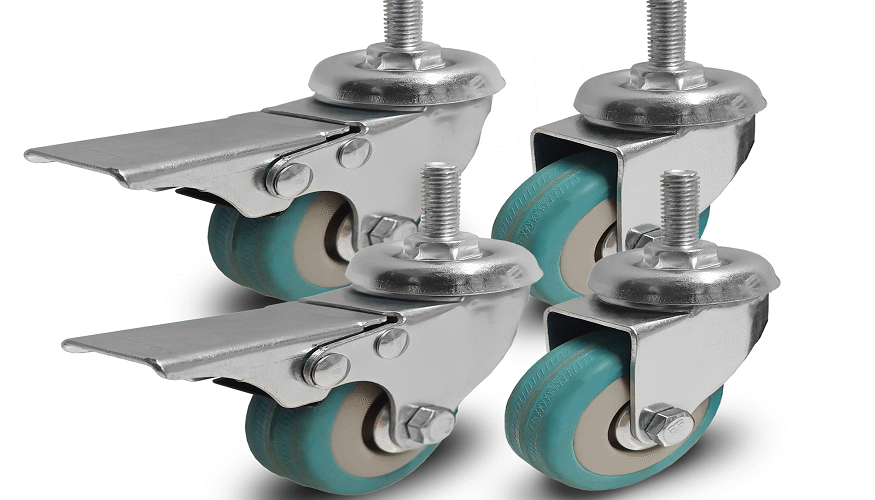In industrial and commercial environments, the right equipment can make all the difference in efficiency and safety. While most people notice machinery, vehicles, or shelving systems, very few realize how much work is done by castors. Specifically, heavy duty castors play a vital role in moving loads that would otherwise require enormous effort or machinery. To get the most out of them, it’s important to understand the different types available and the benefits each brings.
What Defines Heavy Duty Castors?
Heavy duty castors are wheels mounted on frames, engineered to move large loads with ease. They differ from standard castors in their design, material strength, and weight-bearing capacity. Built with robust metals, reinforced bearings, and specialized wheels, these castors can support anywhere from a few hundred kilograms to several tonnes.
But not all heavy-duty castors are the same. Each type is designed with specific purposes in mind, making it critical to choose wisely based on the environment and intended use.
Main Types of Heavy Duty Castors
- Fixed Castors
Fixed castors are designed to move equipment in straight lines. They are perfect for applications where directional control is more important than manoeuvrability.- Best For: Long warehouse aisles or equipment that only needs back-and-forth movement.
- Benefit: Offers maximum stability for heavy loads.
- Swivel Castors
Swivel castors rotate 360 degrees, providing excellent manoeuvrability in tight spaces. They are commonly paired with fixed castors for a balance of movement and control.- Best For: Workshops, hospitals, and environments where frequent direction changes are necessary.
- Benefit: Saves time and effort when moving heavy items.
- Locking Castors
These castors feature braking systems that lock either the wheel, the swivel mechanism, or both. This ensures that equipment stays securely in place when not in motion.- Best For: Medical equipment, mobile shelving, and workstations.
- Benefit: Enhances safety and prevents accidental movement.
- Twin-Wheel Castors
With two wheels mounted side by side, twin-wheel heavy duty castors distribute weight more evenly. They provide greater load capacity and smoother mobility.- Best For: High-capacity carts, industrial racks, and automated machinery.
- Benefit: Reduces wear and tear on floors while increasing stability.
- Spring-Loaded Castors
These are designed with shock-absorbing features, making them ideal for transporting fragile or sensitive items. They reduce vibration and impact during movement.- Best For: Laboratories, electronics manufacturing, or transporting delicate equipment.
- Benefit: Protects goods and reduces noise.
- High-Temperature Castors
Built to withstand extreme heat, these castors are made from materials like phenolic resin or stainless steel. They maintain performance even in ovens, foundries, or bakeries.- Best For: Food processing plants, metalworking industries.
- Benefit: Reliable performance in harsh environments.
Key Benefits Across All Heavy Duty Castors
Regardless of type, heavy duty castors provide several advantages that make them indispensable in industrial operations:
- Enhanced Efficiency: Faster movement of goods saves time and labour.
- Safety: Reduces risk of back injuries and accidents related to manual lifting.
- Durability: High-quality materials extend equipment life and reduce replacements.
- Versatility: Suitable for industries as diverse as healthcare, warehousing, hospitality, and automotive.
- Customizability: With a wide variety of wheel sizes, materials, and mounting styles, businesses can tailor castors to specific needs.
Choosing the Right Type for Your Business
The type of heavy-duty castors you select should align with your industry’s requirements. For example:
- A warehouse might use a mix of fixed and swivel castors for carts.
- A hospital would prioritize swivel and locking castors for manoeuvrability and safety.
- A manufacturing plant could benefit from twin-wheel or spring-loaded castors for stability and load absorption.
By matching castor type to application, businesses can improve mobility, reduce downtime, and boost overall productivity.
Final Thoughts
Not all castors are created equal, and when it comes to heavy loads, choosing the right type is essential. Whether it’s the stability of fixed castors, the manoeuvrability of swivel castors, or the safety of locking castors, each type of heavy-duty castors offers unique benefits.
By investing in the correct castors for your industry, you’re not just buying wheels you’re buying efficiency, safety, and long-term performance. The right choice ensures that every load, no matter how heavy, is moved smoothly and securely.

